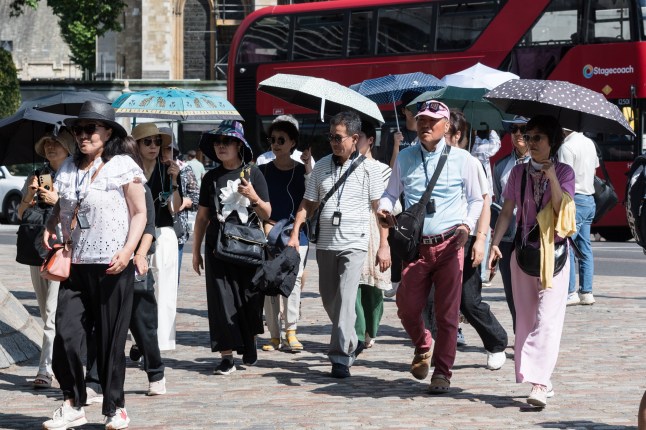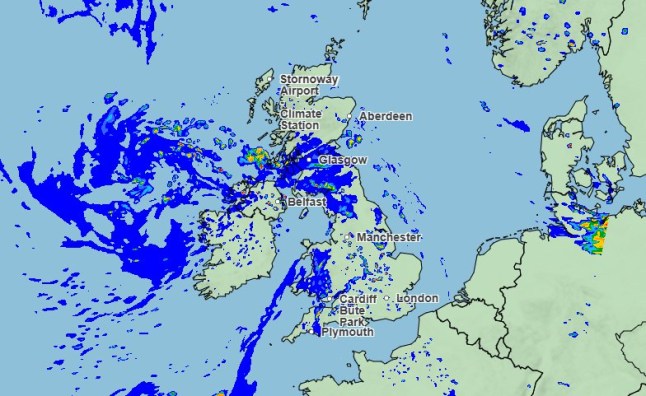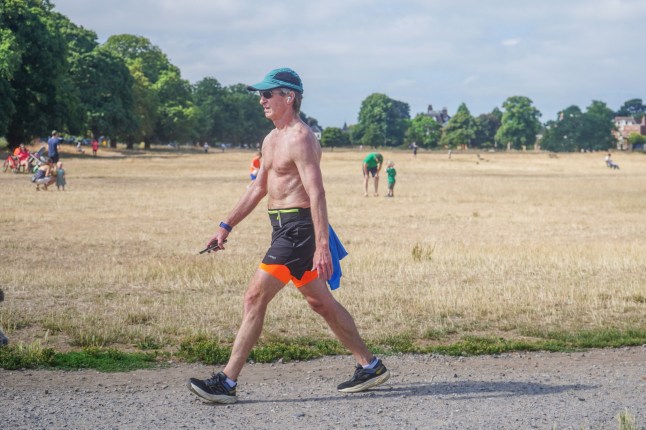Is the UK heatwave now over after temperatures reached 33°C?


Things are set to finally cool down, after parts of the UK reached over 33°C on Sunday during Britain’s third heatwave of 2025.
Several records were broken on Saturday in Scotland, Northern Ireland and Wales, which all recorded their warmest days of the year so far with over 30°C temperatures.
Ross-on-Wye saw the hottest maximum temperature with 33°C, but it was a baking day across the board.
It was so hot that some spectators at Wimbledon needed medical attention due to the heat.
When will the heatwave end?
Sign up for all of the latest stories
Start your day informed with Metro’s News Updates newsletter or get Breaking News alerts the moment it happens.
It’s already ending. Temperatures have dipped, with rain also forecast, and will continue to dip throughout the week.
A spokesperson for the Met Office said on Sunday: ‘It’s been another warm day today, not as hot as yesterday with cloudier skies for some.
‘A change tomorrow with showers or longer spells of rain and turning fresher from the west. The heatwave is coming to an end for most of us today with fresher air arriving tomorrow, but south-eastern England could still see 30C tomorrow, so still classed here.’
By Tuesday, temperatures in London will dip to a much balmier 23°C and some rain – a welcome relief from the sun.

Amber heat health alerts were in place for the Midlands and southern, and eastern England until 9am on Monday.
There have been warnings of a potential rise in deaths, particularly among those aged 65 and over or with health conditions.
Has the next heatwave been forecast yet?
There is no specific heatwave forecast, but the Met Office says that more hot conditions could be on the way, particularly in the south east.
The outlook for Wednesday to Friday will be ‘dry for many, although scattered showers are possible at times, mainly in the north.’
It will then be ‘increasingly warm through the week, particularly in the south, with muggy nights returning.’
Their long range forecast for the rest of July says things will be changeable, but ‘any settled spells could persist for several days at a time and are likely to be accompanied by plenty of sunshine.’
They added: ‘Temperatures are expected to be above normal for the majority of the UK throughout this period.
‘Some hot conditions are likely to develop at times, particularly in southern and eastern areas of the UK.’

So it’s very possible there could be another heatwave, depending on where you are, but for the moment we’re getting a reprieve.
Wildfires and water warnings
Fire chiefs are urging people to stay safe in the heatwave as they warned of the increased risk of wildfires and drowning.
The National Fire Chiefs Council (NFCC) is asking people not to enter water to try to cool down and urging parents and carers to ensure children are supervised around water at all times.
Firefighters in Surrey spent a second day on Sunday tackling a wildfire on Hankley Common in Thursley, which is estimated to have destroyed 2.6 hectares of land.

The risk of wildfires in London is rated ‘severe’ by the Natural Hazards Partnership, exacerbated by the dry weather.
As well as the amber alerts, yellow alerts are in place until Monday for the North East, North West and Yorkshire and Humber.
England is dry, prompting Thames Water to introduce a hosepipe ban for millions, as well as Yorkshire Water to bring in restrictions on using hosepipes for activities such as watering the garden, cleaning cars and filling paddling pools on Friday.
The region is already in drought, but just six inches of rain fell between February and June in one of the driest and warmest springs on record.
Reservoirs have been severely impacted owing to the low rainfalls – half of what normally falls – and are significantly below normal levels for the time of year.
Yorkshire Water is now warning that restrictions may be in place until winter, unless there is enough rainfall to bring stocks back to where they need to be.
Get in touch with our news team by emailing us at webnews@metro.co.uk.
For more stories like this, check our news page.



